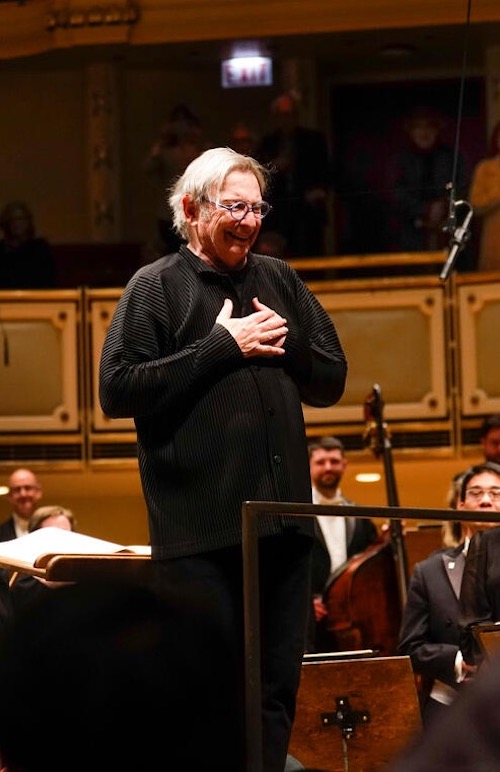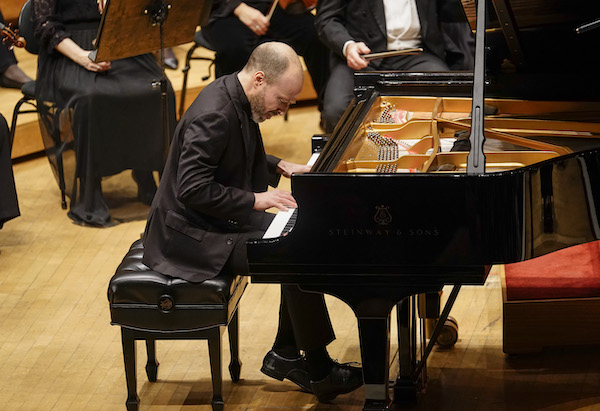MTT makes a heartening CSO return with gracious Mozart, souped-up Brahms

What conductor has enjoyed the longest continuous relationship with the Chicago Symphony Orchestra in its 133-year history?
Georg Solti or Daniel Barenboim? No. Riccardo Muti? Not even close.
That honor goes to Michael Tilson Thomas, whose ongoing 53-year podium run beats even Frederick Stock, who reigned as music director for nearly four decades.
The American conductor first led the orchestra in 1970 at Ravinia at age 25, quickly establishing a close and productive partnership that has endured over the past half-century. That relationship has produced many memorable performances over the decades as well as CSO recordings of Charles Ives symphonies that remain a benchmark.
Tilson Thomas, 78, returned to Orchestra Hall Thursday night, in what was a heartening and emotional occasion. In 2021 the conductor announced that he has glioblastoma multiforme, a particularly aggressive form of brain cancer. Following removal of a large tumor, and a period of convalescence, MTT has courageously renewed his podium career, limiting his appearances to ensembles he has held especially close relationships with including the San Francisco Symphony (where he was music director from 1995-2020), the New World Symphony (which he co-founded in 1987), the New York Philharmonic, and the CSO.
Battling such a devastating disease—which has an average survival term of 12 months—has clearly taken its toll, and it was jarring to see the energetic, long-youthful conductor in his current frail physical state. His stage entrances, exits, and tenuous stepping on and off the podium seemed fraught with peril, and he was occasionally helped by a stagehand and the evening’s concertmaster Stephanie Jeong.
Yet once standing on the podium and after giving the downbeat, Tilson Thomas seemed like his old self—albeit with less animated gestures and limited movements. Most crucially, his singular brand of life-affirming musicality was undimmed, and MTT largely drew the kind of vibrant, high-stepping performances that have endeared him to Chicago audiences over the past half-century.
The first half of the evening was devoted to Mozart— somewhat unusually, for this cornerstone composer has never figured significantly in the conductor’s repertoire. In a recent interview, MTT said that since his illness he has finally been able to come to terms with Mozart’s music “It took me a while to . . . just be able to appreciate, on my own terms, just how beautiful and radiant, how original the music is. I’ve found a much greater comfort zone with Mozart in these last couple of years.”
There aren’t many Mozart works that haven’t been played by the CSO over its long history but MTT managed to find one, presenting the composer’s Six German Dances, K.509, in its belated CSO premiere.
Scored for ample orchestra, this suite of dances is characteristic in its wit and buoyant melody and wholly delightful. It’s hard to account for its near-total neglect in the concert hall.
Tilson Thomas led a warm and affectionate performance that brought out the essential gracious qualities of Mozart’s music. If rhythms were not always ideally incisive, the conductor made up the balance by keenly pointing dynamic contrasts and throwing off the quirky humor of the concluding dances.
Orion Weiss was the soloist in the evening’s centerpiece, Mozart’s Piano Concerto No. 23 (a late change from the scheduled Concerto No. 12).

While it was disappointing not to hear the beautiful, rarely played K. 414, Weiss showed himself a worthy Mozartian in the more familiar Concerto in A Major. His refined style is well-suited to Mozart and, if the interpretation was somewhat lacking in individuality, he brought spirited vivacity to the rollicking final movement. Weiss was at his best in the central Adagio, distilling a rapt degree of interior rumination (despite being bedeviled by a ceaselessly ringing cell phone). The accompaniment was fitfully workmanlike but got the job done.
Weiss was likewise inspired in his encore, a limpid, pointillist rendering of Debussy’s Etude No. 11 (Étude pour les arpèges composés), which was also hampered by a ringing phone.
On paper—or calendar program listings—an Arnold Schoenberg transcription of Brahms’ Piano Quartet No. 1 in G minor might look like a pedantic exercise at best, a deadly experience at worst.
Nothing could be further from the truth. Schoenberg’s loving orchestration of Brahms’ Op. 25 is an absolute blast from start to finish. Brahms’ melodies blossom anew in this large-scale revamp for massive orchestra, a kind of Brahms-on-steroids experience.
At times, the music convincingly sounds like “Brahms’ Fifth Symphony,” as Schoenberg liked to joke. His occasional scoring excesses—including xylophone and tambourine— only serve to add to the antic fun.
This Brahms-Schoenberg confection has long been a Tilson Thomas party piece, and Thursday night’s uproarious performance delivered a hugely enjoyable thrill ride. At times balancing was hectic and some of the most flamboyantly scored sections became even more raucous than Schoenberg likely intended.
Yet amid the fitful cacophony, the performance was charming and irresistible. The CSO’s burnished strings leaned into Brahms’ music, with the main theme of the Andante soaring in this richly upholstered rendition. MTT brought fine brassy swagger to the movement’s march-like middle section, and John Bruce Yeh served up richly colorful clarinet playing throughout.
After the third movement, the conductor paused and jokingly growled and pawed the podium with backward steps like an impatient bull before setting off a fast pace for the Hungarian-flavored finale. The zigeneur main theme went with lightning speed and full-blooded gypsy spirit. The conductor drew great echt-Viennese warmth in the contrasting sections and built the infectious music to a frenetic, blazing coda.
Anyone who loves Brahms’ music should not hesitate to attend one of the three repeat performances—not only for the opportunity to discover Schoenberg’s engaging revamp but also for the chance to pay homage to Michael Tilson Thomas, one of the finest conductors of his generation.
The final performance of this program takes place 7:30 p.m. Tuesday. cso.org